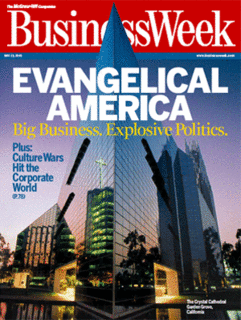The
MAY 23, 2005 issue of Businessweek features the cover story “Evangelical America”.

This is it. For a long time I was expecting with growing concern in my heart that somebody – not necessarily the unbelievers – will start to analyze modern evangelicalism as a sort of business. This raises again at least two questions. First, to which extent the modern marketing technologies should be used (allowed to be used) by the Church. Second, what are our motives/goals of evangelization: get the numbers? get the geography? exercise the power of today’s best technologies, or… let the Spirit work reaching the souls? I know it sounds pretty much medieval and illiterate but my concern is, WWJD?
Excerpts from the editorial Earthly Empires:
"...Pastor Joel is one of a new generation of evangelical entrepreneurs transforming their branch of Protestantism into one of the fastest-growing and most influential religious groups in America. Their runaway success is modeled unabashedly on business. They borrow tools ranging from niche marketing to MBA hiring to lift their share of U.S. churchgoers. Like Osteen, many evangelical pastors focus intently on a huge potential market -- the millions of Americans who have drifted away from mainline Protestant denominations or simply never joined a church in the first place.
To reach these untapped masses, savvy leaders are creating Sunday Schools that look like Disney World (DIS ) and church cafés with the appeal of Starbucks (SBUX ). Although most hold strict religious views, they scrap staid hymns in favor of multimedia worship and tailor a panoply of services to meet all kinds of consumer needs, from divorce counseling to help for parents of autistic kids. Like Osteen, many offer an upbeat message intertwined with a religious one. To make newcomers feel at home, some do away with standard religious symbolism -- even basics like crosses and pews -- and design churches to look more like modern entertainment halls than traditional places of worship.
...
Branding whizzes that they are, the new church leaders are spreading their ideas through every available outlet. A line of "Biblezines" packages the New Testament in glossy magazines aimed at different market segments -- there's a hip-hop version and one aimed at teen girls. Christian music appeals to millions of youths, some of whom otherwise might never give church a second thought, serving up everything from alternative rock to punk and even "screamo" (they scream religious lyrics). California megachurch pastor Rick Warren's 2002 book, The Purpose-Driven Life, has become the fastest-selling nonfiction book of all time, with more than 23 million copies sold, in part through a novel "pyro marketing" strategy. Then there's the Left Behind phenomenon, a series of action-packed, apocalyptic page-turners about those left on earth after Christ's second coming, selling more than 60 million copies since 1995.
Evangelicals' eager embrace of corporate-style growth strategies is giving them a tremendous advantage in the battle for religious market share, says Roger Finke, a Pennsylvania State University sociology professor and co-author of a new book, The Churching of America, 1776-2005: Winners and Losers in Our Religious Economy.
With such low barriers to entry, the number of evangelical megachurches -- defined as those that attract at least 2,000 weekly worshippers -- has shot up to 880 from 50 in 1980, figures John N. Vaughan, founder of research outfit Church Growth Today in Bolivar, Mo. He calculates that a new megachurch emerges in the U.S. an average of every two days. Overall, white evangelicals make up more than a quarter of Americans today, experts estimate.

Historically, much of the U.S. political and business elite has been mainline Protestant. Today, President George W. Bush and more than a dozen members of Congress, including House Speaker Dennis Hastert, are evangelicals. More important, the Republican Right has been fueled by the swelling ranks of evangelicals, whose leaders tend to be conservative politically despite their progressive marketing methods. In the 1960s and '70s, prominent evangelicals like Billy Graham kept a careful separation of pulpit and politics -- even though he served as a spiritual adviser to President Richard M. Nixon. That began to change in the early 1980s, when Jerry Falwell formed the Moral Majority to express evangelicals' political views. Many of today's evangelicals hope to expand their clout even further. They're also gaining by taking their views into Corporate America.







